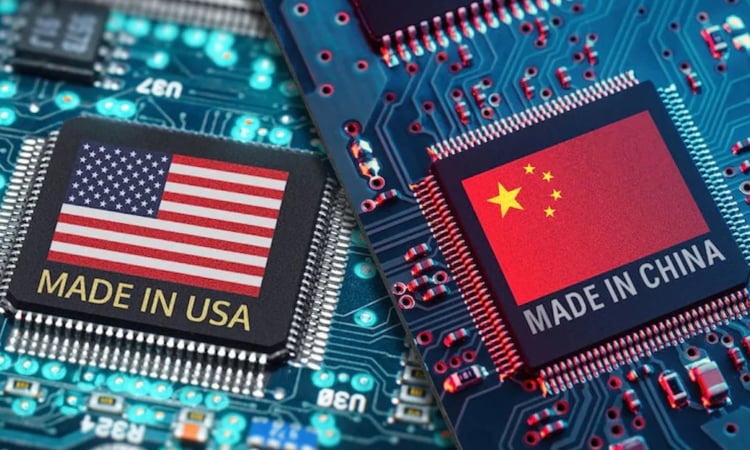News Flash
News Flash

BEIJING, July 16, 2025 (BSS/AFP) - The United States has in recent years sought to curb exports of cutting-edge semiconductors to China, with Nvidia and other US chip companies lobbying against its tough restrictions.
As Nvidia says it will resume sales of a less powerful AI semiconductor model to China, here is a run-down of the microchip conflict:
August 2022: Biden's Chips Act
Joe Biden, then US president, signs a bill to boost domestic chipmaking, an industry Washington fears China could come to dominate through mammoth state-backed investments.
The Chips and Science Act includes around $52 billion to promote the production of microchips, the tiny components that power almost all modern machinery.
October 2022: Export controls
Washington suddenly restricts exports of some high-end microchips -- crucial to the manufacturing of powerful AI systems -- to China on national security grounds.
The rules, which also toughen requirements on the sale of semiconductor equipment, aim to limit Beijing's access to state-of-the-art chips with military applications.
China says the United States is attempting to "maliciously block and suppress Chinese businesses".
December 2022: Blacklist
The US blacklists 36 Chinese companies, including advanced chip producers, severely restricting their use of American semiconductor manufacturing tech and designs.
Many of them have close ties to China's defence sector, with some linked to efforts to develop hypersonic and ballistic missile systems.
October 2023: US tightens curbs
A year after those restrictions -- and following the November 2023 release of OpenAI's generative AI chatbot ChatGPT -- Washington tightens the screws on China.
As the world discovers the powers of AI, the release by China-owned Huawei of a new smartphone featuring a powerful home-grown advanced chip also sparks US alarm.
Attention has so far been focused on Nvidia's industry-leading H100 chip, but the export curbs are widened to other, lower-performing semiconductors made by Nvidia and its peers.
December 2024 - January 2025: Biden's final moves
In the weeks before Donald Trump returns to the White House, Biden imposes a series of new rules on high-end chip exports to China.
One of them requires authorisations for exports, re-exports and in-country transfers -- a bid to avert any circumvention of chip supply to China from other nations.
There are some exceptions for countries considered friendly to the United States, but most face a cap on imports of advanced chips.
"The US leads the world in AI now -- both AI development and AI chip design -- and it's critical that we keep it that way," Commerce Secretary Gina Raimondo says.
The new rules will take effect in 120 days -- giving Trump's incoming administration time to potentially make changes.
January 2025: Deepseek moment
Chinese firm DeepSeek's artificial intelligence chatbot soars to the top of the Apple download charts, stunning industry insiders and analysts with its ability to match its US competitors.
May 2025: Trump reverses Biden-era controls
The Trump administration rescinds some of the chip export controls, answering calls by countries who said they were shut out from crucial technology needed to develop AI.
Some US lawmakers feared the cap would have incentivised countries to go to China for AI chips, spurring the superpower's evolution into a tech superpower.
As an alternative, the US Commerce Department reminds AI actors that using Huawei Ascend, the Chinese tech giant's most advanced chip, violates US export controls -- something Beijing later slams as "bullying".
April 2025: H20 blocked
Nvidia has developed new H20 semiconductors -- a less powerful version of its AI processing units designed specifically for export to China.
But the tech giant says it has been told by Washington that it must obtain licences to ship the H20s to China because of concerns they may be used in supercomputers there.
July 2025: H20 sales resume
Nvidia says it will resume sales of its H20 chips to China, after Washington pledged to remove the licensing curbs.
CEO Jensen Huang is expected to attend a major supply chain gathering in Beijing -- his third trip to China this year, Chinese state media says.